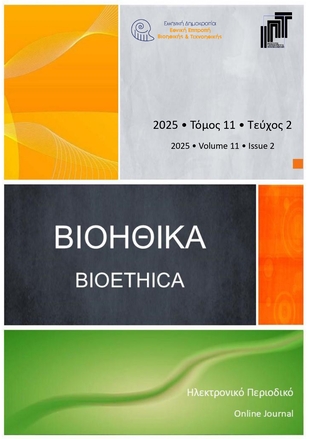ΤΝ και Δημοκρατία: Προβληματισμοί, σενάρια και ηθικά διλήμματα

Περίληψη
Έστω ότι η Τεχνητή Νοημοσύνη μετουσιώνει την 4.0 Βιομηχανική Επανάσταση και έστω ότι η Τεχνοηθική αποτελεί τον διαθεματικό εκείνο κλάδο που αφουγκράζεται και διερευνά τον βαθμό στον οποίο τα αξιακά μας συστήματα επηρεάζονται υπό το φως των νέων τεχνολογιών, το παρόν άρθρο φέρνει στο προσκήνιο απόψεις επιστημόνων και ερευνητών αναφορικά με το μέλλον της ανθρώπινης κοινωνίας, την πολιτική και τη δημοκρατία. Είναι ικανή η υπερβολική ανάπτυξη της TN τόσο στην ιδιωτική όσο και στη δημόσια σφαίρα να επηρεάσει τον τρόπο με τον οποίο σκεφτόμαστε, κρίνουμε, ενεργούμε, αντιδρούμε, λαμβάνουμε (ή αναθέτουμε) αποφάσεις και συμμετέχουμε στα κοινά; Αξιοποιώντας το πεδίο της νευροηθικής και της πολιτικής επιστήμης, ταξινομούμε τις διαδικασίες της λήψης πολιτικών αποφάσεων, ενώ προβάλλουμε τις απόψεις τεχνο-αισιόδοξων και τεχνο-πεσιμιστών μελετητών. Υπό τη δομή βιβλιογραφικής επισκόπησης, παρουσιάζονται επιχειρήματα που κυμαίνονται από την καλόπιστη χρήση της ΤΝ, τον λυσιλογισμό [solutionism], την ενισχυμένη δημοκρατική εκπροσώπηση, έως τους δημοκρατικούς κινδύνους της αλγοριθμικής λήψης αποφάσεων [ADM], τους θαλάμους αντήχησης [echo chambers], τις προκαταλήψεις της ΤΝ και τα κενά στη Λογοδοσία, την Ευθύνη, τη Διαφάνεια και την Εξήγηση. Στο τελευταίο μέρος παρουσιάζονται προτάσεις και ηθικά διλήμματα για μελλοντική έρευνα και δημόσιο διάλογο.
Λεπτομέρειες άρθρου
- Πώς να δημιουργήσετε Αναφορές
-
Σαμπαθιανάκη Α. (2025). ΤΝ και Δημοκρατία: Προβληματισμοί, σενάρια και ηθικά διλήμματα. Βιοηθικά, 11(2), 41–56. https://doi.org/10.12681/bioeth.42843
- Ενότητα
- Ανασκοπήσεις

Αυτή η εργασία είναι αδειοδοτημένη υπό το CC Αναφορά Δημιουργού 4.0.
Οι Συγγραφείς που δημοσιεύουν εργασίες τους σε αυτό το περιοδικό συμφωνούν στους παρακάτω όρους:
- Οι Συγγραφείς διατηρούν τα Πνευματικά Δικαιώματα και χορηγούν στο περιοδικό το δικαίωμα της πρώτης δημοσίευσης, ενώ ταυτόχρονα τα πνευματικά δικαιώματα της εργασίας προστατεύονται σύμφωνα με την Creative Commons Attribution CC BY 4.0, που επιτρέπει άμεση πρόσβαση στις εργασίες και κάθε χρήστη να διαβάζει, να κάνει λήψη, να αντιγράφει, να διανέμει, να εκτυπώνει, να αναζητά, ή να συνδέει με το πλήρες περιεχόμενο των άρθρων, να τα αναζητά για ευρετηρίαση, να τα χρησιμοποιεί ως δεδομένα σε λογισμικό, ή να τα χρησιμοποιεί για οποιοδήποτε άλλο νόμιμο σκοπό. Προϋπόθεση ε΄ιναι η αναφορά στον αρχικό δημιουργό/ούς και την αρχική δημοσίευση σε αυτό το περιοδικό.
- Οι Συγγραφείς μπορούν να συνάπτουν ξεχωριστές, και πρόσθετες συμβάσεις και συμφωνίες για την μη αποκλειστική διανομή της εργασίας όπως δημοσιεύτηκε στο περιοδικό αυτό (π.χ. κατάθεση σε ένα ακαδημαϊκό καταθετήριο ή δημοσίευση σε ένα βιβλίο), με την προϋπόθεση της αναγνώρισης και την αναφοράς της πρώτης δημοσίευσης σε αυτό το περιοδικό.
Το περιοδικό Βιοηθικά επιτρέπει και ενθαρρύνει τους συγγραφείς να καταθέτουν τα δημοσιευμένα άρθρα σε θεσμικά (π.χ. το αποθετήριο του Εθνικού Κέντρου Τεκμηρίωσης) ή θεματικά αποθετήρια (π.χ. αποθετήριο SSOAR για τις Κοινωνικές Επιστήμες), μετά τη δημοσίευσή τους στο περιοδικό «Βιοηθικά» και με όρους Ανοικτής Πρόσβασης, όπως κατά περίπτωση προσδιορίζονται από τους χρηματοδότες της έρευνάς τους ή/και τα ιδρύματα με τα οποία συνεργάζονται.
Κατά την κατάθεση της εργασίας τους, οι συγγραφείς πρέπει να παρέχουν πληροφορίες σχετικά με τη δημοσίευση του άρθρου στο περιοδικό «Βιοηθικά» και τις πηγές χρηματοδότησης της έρευνάς τους.
Κατάλογοι των ιδρυματικών και θεματικών αποθετηρίων ανά χώρα υπάρχουν στη βάση http://opendoar.org/countrylist.php . Οι συγγραφείς έχουν τη δυνατότητα να καταθέσουν χωρίς κόστος την εργασία τους στο αποθετήριο www.zenodo.org, το οποίο υποστηρίζεται από το OpenAIRE (www.openaire.eu ), στο πλαίσιο των πολιτικών της Ευρωπαϊκής Επιτροπής για την ενίσχυση της Ανοικτής ακαδημαϊκής έρευνας.


